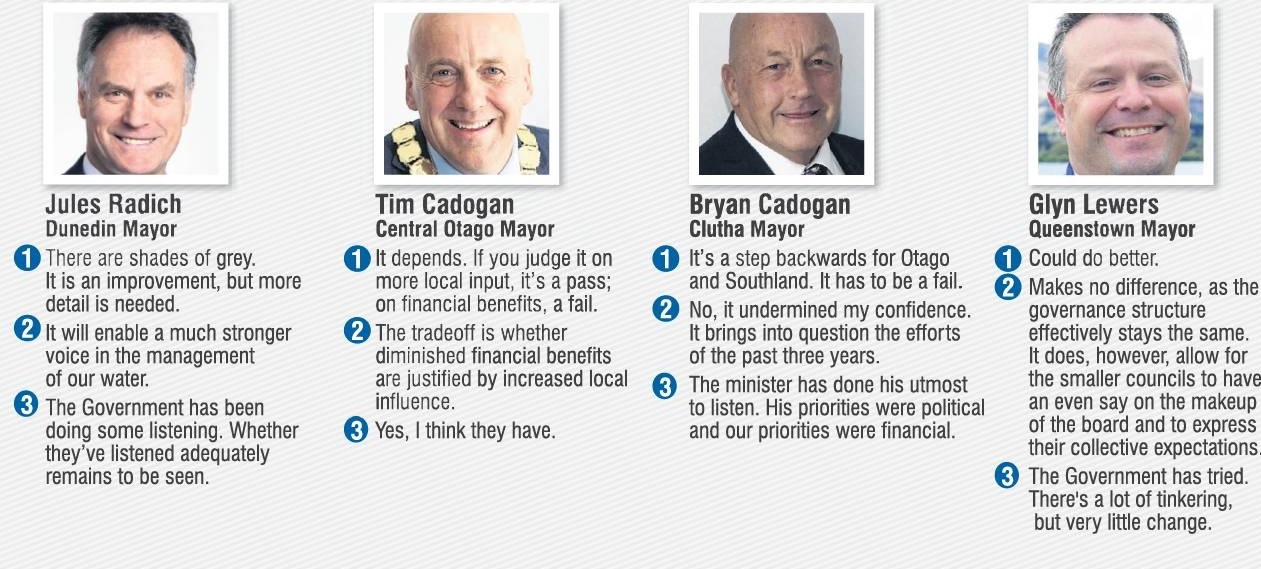
Bryan Cadogan said the best way for South Island communities to achieve water upgrades was to use their combined strength to pay for them, but this would be diluted by boosting the number of planned water entities across the country from four to 10, announced yesterday.
"It disadvantages Otago and Southland, compared to the original proposal," Mr Cadogan said.
"If I had known three years ago that this would be the ultimate result, I would’ve been a ‘stop Three Waters’ person."
The Government’s move yesterday was aimed at curbing criticism about its reform agenda producing much-diminished local influence in decision-making.
Otago and Southland will be covered by one water entity, instead of being grouped with almost all of the South Island.
It was unclear yesterday how the Waitaki district would be treated, as part of it aligns with Environment Canterbury and some with the Otago Regional Council.
Waitaki Mayor Gary Kircher said the district council was seeking clarification from the Department of Internal Affairs.
The Government left a contentious element of reform untouched — co-governance provisions with iwi.
The general model, which includes taking functions away from councils in an effort to make it easier to afford looming and necessary water works, remains largely intact.
The Government also pushed out the timeframe for when the entities might form by up to two years and cancelled a planned $1.5 billion round of funding to help councils pay for community wellbeing projects.
Mr Cadogan said Minister of Local Government Kieran McAnulty had done his utmost to listen to concerns, but pensioners and vulnerable families in Otago and Southland would wear the result.
His brother, Central Otago Mayor Tim Cadogan, agreed people on fixed incomes would face bigger water bills than they otherwise might have, because of the Government’s changes.
Tim Cadogan said he felt deflated by this. The reforms were an effort to "get ahead of costs coming our way".
Reactions from mayors in the South to the adjustments yesterday ranged from disappointment to cautiously greeting them as a step in the right direction.
Dunedin Mayor Jules Radich was pleased the number of water entities was boosted to 10.
He was wary of providing endorsement beyond this.
Queenstown Mayor Glyn Lewers said smaller councils would have an enhanced level of say than previously planned.
"However, out of all the options presented to us early in the design of the reforms, this was one of the least favoured, as it means the financial savings are reduced," Mr Lewers said.
"So those on fixed incomes will still face increases in water service charges to a greater extent than what was originally proposed."
However, the status quo would have produced a worse result, he said.
Dunedin city councillor Jim O’Malley said the Government appeared to have listened to concerns about loss of regional control of water services.
"There’s no doubt regulatory change will ensure our communities continue to receive safe and affordable water services into the future, but questions remain about the underlying economic model."
Ngāi Tahu supported the four-entity model legislated just before Christmas and the iwi’s freshwater group chairman Prof Te Maire Tau said there was no need for sudden changes that could result in smaller communities struggling with finances.
However, the iwi would work under the new approach in the interests of reaching the ultimate shared goal of safe, equitable and financially sustainable water services for all communities.
What Southern mayors say
Mayors in the South were asked their opinions on the changes to Three Waters announced yesterday. They were asked three questions:
1 - Do you give the changes to the "affordable water reforms" a pass or a fail mark?
2 - Does having 10 regional entities, including and Otago and Southland grouping, give you more confidence in the reforms?
3 - Has the Government properly listened to concerns from councils?













